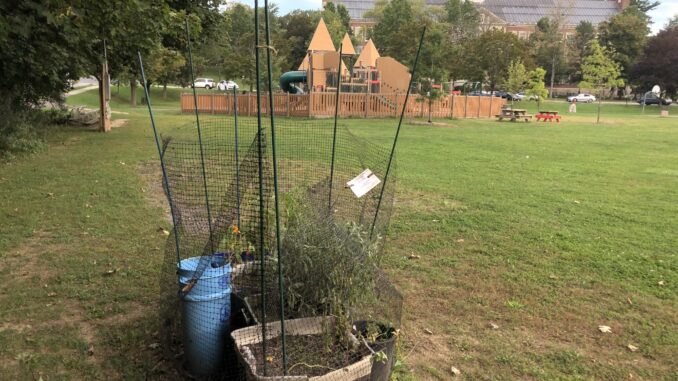
Large pieces of land, not owned by any one person, family or organization, but owned by the people — where anyone could come and plant their own food for themselves and their family and use Earth’s natural resources freely. These were the Commons in Medieval Europe, a space of land such as fields, pastures or forests owned by everyone.
Over time, these places became claimed by the aristocracy and the Church, and the Commons as they were known disappeared. But now, thousands of years later, there are still talks of reestablishing the Commons once more.
Such was the inspiration for Amanda Sisentein, volunteer coordinator for the De Facto Community Center Project when she and other organization members decided to establish “pop-up” community gardens around New Paltz and Kingston.
“That’s kind of a tiny little bit of that idea, having edible food available for anyone and everyone in public spaces,” explained Sisentein.
The gardens were first planted about seven years ago in New Paltz and have been kept up by Sisentein and other De Facto volunteers. But anyone from the community is encouraged to help weed and water the gardens.
Garden locations include Hasbrouck Park, spots along the rail trail and near the parking lot of the Moriello Pool.
Sisenstein, who has a background in farming, works hard to ensure there’s a variety of harvest planted. She often collects seeds donated by local farms and buys seeds from the Hudson Valley Seed Company.
The long list of crops that have grown in the past seven years include: tomatoes, cucumbers, squash, peppers, herbs such as sage, basil and cilantro, echinacea, kale, chard, turnips, carrots, arugula and garlic.
“There should just be food, you should just be able to wander into the park and have a snack,” said Sisenstein, “There should just be free resources for anyone in the community.”
The gardens have additional purposes in self-sufficiency and combating climate change. When establishing the gardens, Sisenstein was also inspired by the idea of transition towns which refers to grassroot community projects aimed at these goals.
There was a brief transition town movement in New Paltz about 10 years ago, that many of the members of the De Facto Community Center Project were a part of, but that movement has faded out. The gardens are a lasting testament to these efforts.
The gardens are only one small part, however, of the De Facto Community Center Project’s aims overall.
The long-term goal of the De Facto Community Center Project is to establish a local community center that provides basic needs and resources such as food, showers and shelter but is also a space “where people from all walks of life and all levels of privilege come together to work on advocacy, community service, and cultural projects,” according to the project’s GoFundMe.
The idea originated within New Paltz Food Not Bombs, which Sisenstein was heavily involved with. The volunteers were discussing how they’d like to be able to provide people with food more than once a week and to have a place to organize.
Then, one member said that what they need is a building. And the rest of the idea sprung from there. The creation of this center has been a long time in the making, and the organization still has a long way to go.
But for now, the individuals involved with the effort have been fundraising, researching the best way to make the center a sustainable establishment and speaking to lawyers.
As it is hoped that the center can become a hub for community activism and advocacy, the members of the De Facto Community Center Project have been staying involved in direct action in the community.
Currently, members of the project are working to raise funds and assist with the Hudson Valley Eviction Defense, an organization that provides legal defense and direct tenant assistance to individuals threatened by eviction in Ulster and surrounding counties.
Members of the project also participate weekly and advocate for the “Continuation of Gentrification: Kingston On the Auction Block, Wednesday Walk 4 Black Lives.” Which demands that Kingston City Hall make fundamental changes to plans that would cause gentrification in the city.
Before the pandemic, the organization would raise funds for the center through an annual, affordable craft fair. They would also create “pocket libraries,” and produce zines and podcasts.
The pandemic halted many of the projects and activities members of the project were working on, including Food Not Bombs, but Sisenstien encourages all individuals to volunteer and help out to get some of these things started again.
To get involved with the De Facto Community Center Project, contact Sisenstien by phone (845) 419-8078, email npzdefactoproject@gmail.com, or reach out by social media on Instagram: @defactocommunitycenterproject or Facebook: NPZ De Facto Community Center Project.
